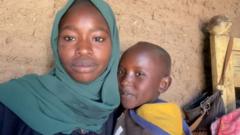The World Food Programme has revealed that el-Fasher, a city in Sudan's Darfur region, is on the brink of starvation as conflict persists. Over 300,000 residents are largely cut off from food aid for more than a year, with reports of malnutrition and desperate survival tactics emerging.
Impending Starvation Looms Over El-Fasher Amid Ongoing Civil Conflict in Sudan

Impending Starvation Looms Over El-Fasher Amid Ongoing Civil Conflict in Sudan
The UN warns of severe food shortages as families in el-Fasher, Sudan, face starvation amid a lengthy siege by paramilitary forces.
Residents in el-Fasher, a city besieged by paramilitary fighters in Sudan, are facing a dire humanitarian crisis, with the UN’s World Food Programme (WFP) warning of potential starvation. For over a year, food delivery routes to the city, located in the western Darfur region, have been obstructed, leaving families without essential supplies. The Rapid Support Forces (RSF), seeking control of el-Fasher from the Sudanese army, have surrounded the city for nearly 16 months, exacerbating the situation amid a civil war that broke out in April 2023 due to a power struggle between military factions.
Local activists report increasing death tolls due to starvation, with the city's population of approximately 300,000 suffering significantly. The UN’s children's agency, UNICEF, has painted a grim picture of malnutrition rates across Sudan, indicating that many children are “reduced to skin and bones.”
The alarm raised by the WFP follows an earlier appeal for urgent aid from North Darfur Governor Al-Hafiz Bakhit, who described the conditions in el-Fasher as unbearable. The continuous conflict has seen recent escalations as the RSF, having been removed from the capital Khartoum, intensifies its efforts to capture el-Fasher, a critical stronghold.
In a recent UN report, it was revealed that 38% of children under five in displacement camps around el-Fasher suffer from acute malnutrition. The situation has led to skyrocketing prices for scarce food supplies, with desperate residents reportedly resorting to eating animal feed and food waste. The WFP’s regional director for eastern and southern Africa, Eric Perdison, emphasized that without immediate aid, lives would be lost.
An eight-year-old girl identified as Sondos shared her harrowing experience upon fleeing el-Fasher, recounting that the only reality there is one of hunger and violence, as her family relied on limited millet for sustenance. While the WFP has indicated its readiness to deliver food assistance, it is awaiting support from the RSF to allow a ceasefire for deliveries to occur, following a recent attack on a UN convoy.
The Sudanese armed forces' chief, Gen. Abdel Fattah al-Burhan, had reportedly agreed to a temporary ceasefire, although the RSF has not confirmed its acceptance, raising concerns that the ongoing conflict could further hinder humanitarian efforts.
Approximately one million individuals have fled el-Fasher since the start of the conflict, fearing the imminent threats of bombings and faction violence along escape routes. While there has been some progress in delivering aid to other areas of Darfur, this could easily be undone with the onset of the rainy season, complicating transport logistics.
UNICEF’s representative in Sudan, Sheldon Yett, noted minor improvements in certain regions, attributing it to the army’s actions against the RSF. However, he warned that resources are dwindling due to recent funding cuts, reiterating that the crisis requires urgent international attention to prevent catastrophic consequences, especially for the children caught in this devastating conflict.


















